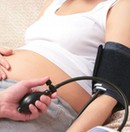Ectopic pregnancy is a potentially life threatening condition. Read about the causes and symptoms of ectopic pregnancy and treatment for the condition.
What is ectopic pregnancy?
An ectopic pregnancy is literally a pregnancy that is out of place. In the vast majority of cases the pregnancy is developing in one of the fallopian tubes, hence the alternative name, ‘tubal pregnancy’. In 2-5% of cases the ectopic pregnancy has settled either in the abdomen, the cervix or the ovary. These organs are unable to nurture a fetus while it develops and grows, so they will eventually burst, causing potentially life threatening haemorrhage.
An ectopic pregnancy cannot result in a live baby. The safety of the mother is paramount.
What causes ectopic pregnancy?
Ectopic pregnancy occurs in 1% of pregnancies and is caused by damage to the fallopian tube or the small hairs, called cilia, which normally waft the fertilised egg to the uterus in the few days after conception. This could be due to:
- Previous fallopian tube surgery
- Abnormality of the fallopian tubes
- Endometriosis
- Infection such as Pelvic Inflammatory Disease, PID, which is associated with Sexually Transmitted Infections such as Chlamydia and gonorrhoea
- Women who are using progesterone only contraceptives are also at slightly increased risk of ectopic pregnancy.
What are the symptoms of ectopic pregnancy?
Early symptoms of ectopic pregnancy are very similar to the symptoms of early pregnancy:
- Nausea
- Possibly light bleeding/spotting, not dissimilar to an implantation bleed
- Missed period
- Breast tenderness
- Pain is the first sign of ectopic pregnancy, though it may be mild at first. It may be in the pelvis or moving across the abdomen.
The later symptoms of ectopic pregnancy are severe:
- Shoulder pain is a symptom of severe internal bleeding
- Dark blood loss
- Acute abdominal pain, similar to appendicitis
- Due to blood loss and pain the woman may show signs of shock – pale, clammy, feeling faint and breathless. This is a medical emergency.
| Find the Right Pregnancy & Birth Book for You!Click here for the Most Popular International BestSellers | ||||
 |
 |
 |
||
How is ectopic pregnancy diagnosed?
If ectopic pregnancy is suspected, you will be advised to go to your closest Emergency Department. Initially the medical team will need to diagnose whether or not you are pregnant and then where the pregnancy is growing. A simple urine test will confirm a pregnancy and a blood test to look at your pregnancy hormone level hCG. This hormone is usually present from 10 days following conception and the level doubles every 2 days for the first 10 weeks of pregnancy. In ectopic pregnancy the levels are unusually low for the gestation period – that is the length of time since your last menstrual period.
A pelvic examination and an ultrasound scan will also be helpful in locating pain, tenderness, a growing mass or blood clot and possibly the location of the growing pregnancy.
If there is uncertainty about whether or not you are pregnant, and whether or not the pregnancy is in the womb, doctors will closely monitor you every 2 days to ascertain whether you are at risk of an ectopic pregnancy.
What is the treatment for ectopic pregnancy?
The treatment for ectopic pregnancy will depend upon how advanced the pregnancy has become.
If the ectopic pregnancy is diagnosed early and there are no perceived risks to the mother the treatment may exclude surgery. A medication called methotrexate may be used to prevent infection and dissolve the fertilised egg, allowing it to be reabsorbed by the body without surgical removal. This medication is given on prescription only, by injection, and it is important to avoid pregnancy for 3 months after taking the medication as it may harm an unborn baby.
If the pregnancy is more advanced, surgery will be necessary to remove the embryo, before further growth harms the mother. Often this can be done using a laparoscope – a fine camera inserted via a small cut near the naval. This leaves less scarring and holds less risks than major abdominal surgery. The surgeon will try to conserve the fallopian tube to increase the chance of subsequent pregnancies, but this is not always possible.
Methotrexate is also used occasionally in combination with surgery if there is doubt about whether part of the ectopic pregnancy has been retained following surgery. The blood hCG levels should return to zero over the next 12 weeks.
What are the risks and complications associated with ectopic pregnancy?
The most serious risk of ectopic pregnancy is that is not detected until the mother has become critically ill. This can be minimised by women or child bearing age presenting early to hospital with abdominal pain and the staff being vigilant about diagnosing ectopic pregnancy.
Following the treatment of ectopic pregnancy there is a risk of difficulty conceiving in the future. 30% of women who have had a previous ectopic pregnancy will have problems getting pregnant again, even if the fallopian tube was not removed. The risk of infertility following ectopic pregnancy is increased further if a fallopian tube was removed.
Women who have had an ectopic pregnancy are at risk of a repeat ectopic pregnancy and should always inform their carers of a previous ectopic pregnancy, so that the health professionals can be vigilant in the first few weeks of pregnancy.
What to expect after an ectopic pregnancy
The recovery after an ectopic pregnancy will depend upon how serious the woman’s condition was and the treatment she received. General advice would include:
- Rest, time off work and help with child care. Do not be surprised if you are very tired and tearful after the treatment/surgery
- Light diet for a few days
- Plenty fluids
- Possibly antibiotic medication to prevent or treat infection
- Close monitoring of hCG levels to ensure they return to normal
- Contraceptives, particularly if methotrexate was taken
- Discussion with your doctor about any advice regarding future pregnancies.
In addition to this an ectopic pregnancy is a lost pregnancy and hence a lost child. The woman and her whanau may experience acute grief at the loss of the baby as well as the shock of the illness of the mother too. Support from family and friends will be vital and health professionals such as your GP will be available to provide support. In addition support is available from the Miscarriage Support Group listed below.
Any woman who is sexually active and experiences abdominal pain could have an ectopic pregnancy and should seek medical advice immediately.
Useful articles
For more information on Miscarriage visit our Kiwi Families article
There is a great support group for miscarriage in New Zealand. To read more about it visit Miscarriage Support.








